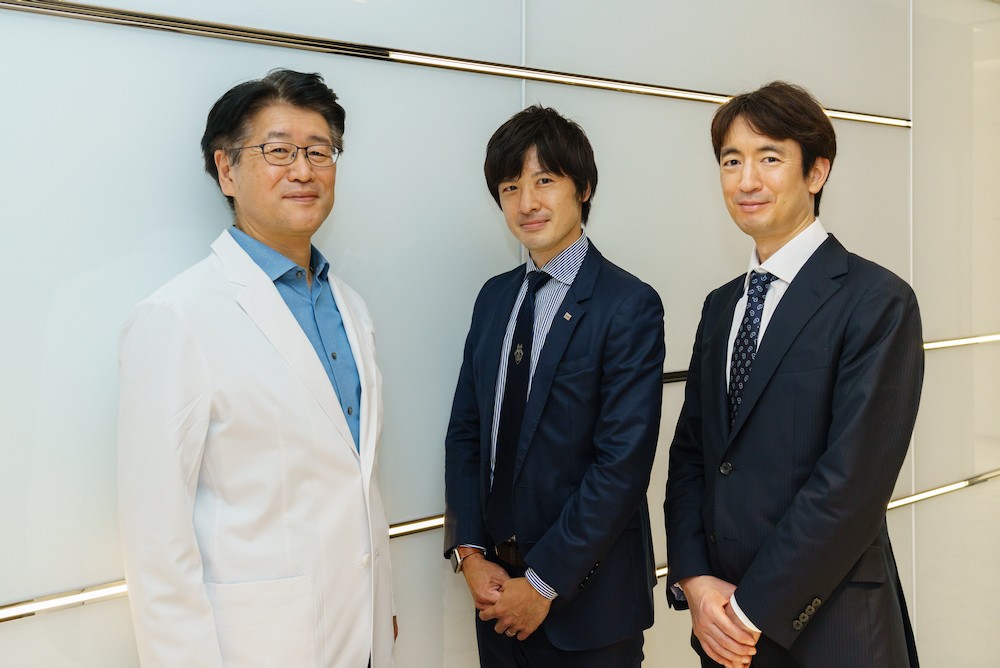Worried About Your Future Health? Toshiba’s AI Technologies Can Predict Your Risk of Developing a Lifestyle Disease (Part 1)
2020/10/28 Toshiba Clip Team
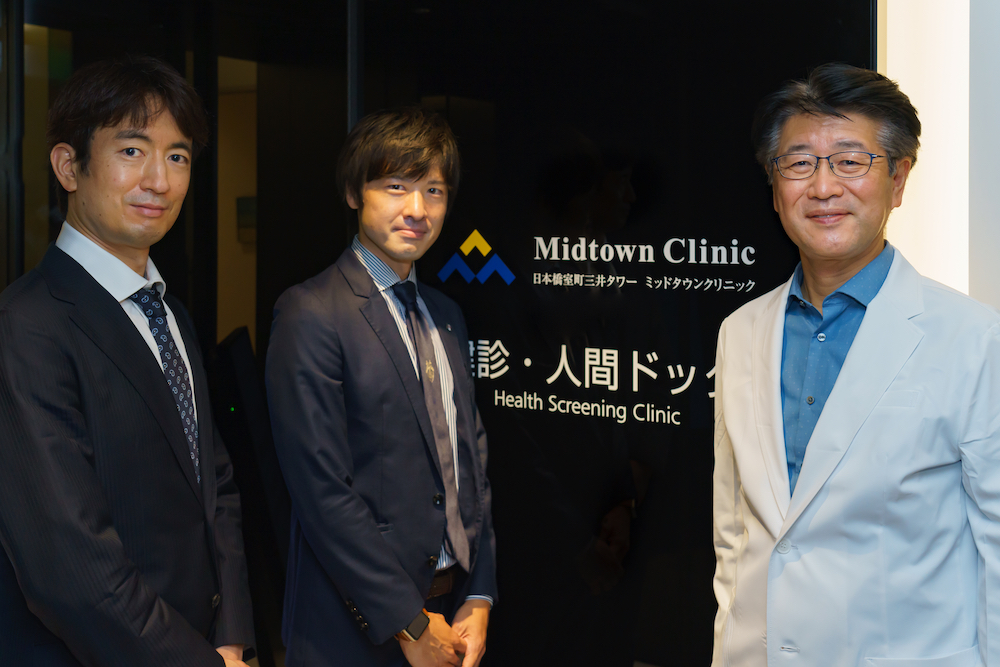
Are you guilty of not getting enough exercise? Perhaps eating or drinking too much? Every time we go for a medical check-up, most of us probably think, “I’m going to get rid of all these bad habits and be healthier.” But how do we know whether our efforts are paying off in any meaningful way? It’s hard to keep going when we can’t really feel ourselves getting healthier. Trying to change lifestyle habits through sheer force of will alone is a colossal effort.
To address this universal challenge, Toshiba is mobilizing three of its strengths: artificial intelligence (AI) technologies developed through research spanning more than 50 years, the expertise to create value by analyzing extensive data gathered in manufacturing over more than 140 years, and the ability to develop agile software. In this two-part edition, we zoom in on a solution being developed by Toshiba and physicians working on the frontlines of medical practice that will help us stay healthy. This first part focuses on introducing an AI for prediction of risk of lifestyle diseases by calculating and visualizing when a patient’s way of life will turn into a lifestyle disease.
A Professional Physician Weighs in on AI-Driven Healthcare of the Near Future
“Have you ever heard of the term metabolic domino? The concept describes a chain reaction caused from unhealthy lifestyle and then lifestyle diseases like hypertension (high blood pressure), hyperglycemia (high blood sugar levels) and hyperlipidemia (high cholesterol) that lead to conditions that disrupt our lives, such as blindness or the need for dialysis treatment. In the worst case, the domino effect can also extend to life-threatening diseases including strokes and heart failures.”
So says Dr. Junichi Taguchi, Director of Tokyo Midtown Clinic. In addition to his expertise in arteriosclerotic diseases such as brain and heart diseases, Dr. Taguchi treats a wide range of patients diagnosed with metabolic syndrome and diabetes. He is also working on utilizing data from medical check-ups and DNA information to prevent diseases. Speaking from his vast knowledge of preventative measures and treatments, Dr. Taguchi says that metabolic syndrome is a step away from lifestyle diseases, and fixing health habits at this stage can help prevent the development of life-threatening diseases later on.
However, as many of us have experienced, even if we’re told by a doctor to change our habits, if we’re not in pain and nothing really feels wrong, we often end up carrying on our lives as usual. So Dr. Taguchi is now thinking of using Toshiba’s AI for prediction of risk of lifestyle diseases. This AI uses data from individual medical check-ups to predict what sort of lifestyle diseases the patient will face in the future if their health condition is left to worsen. The risk of developing a disease varies from person to person. However, because the AI produces values based on the patient’s own data, the values hold greater weight and will allow physicians to demonstrate more of their expertise and experience. What this means, according to Dr. Taguchi, is that physicians can rely on the AI to take care of everything that can be handled through data processing. This leaves them free to focus on doing what only they can do as experts on the frontlines of medical practice: taking the time to talk with each of the patients and using their expansive knowledge to offer detailed guidance.
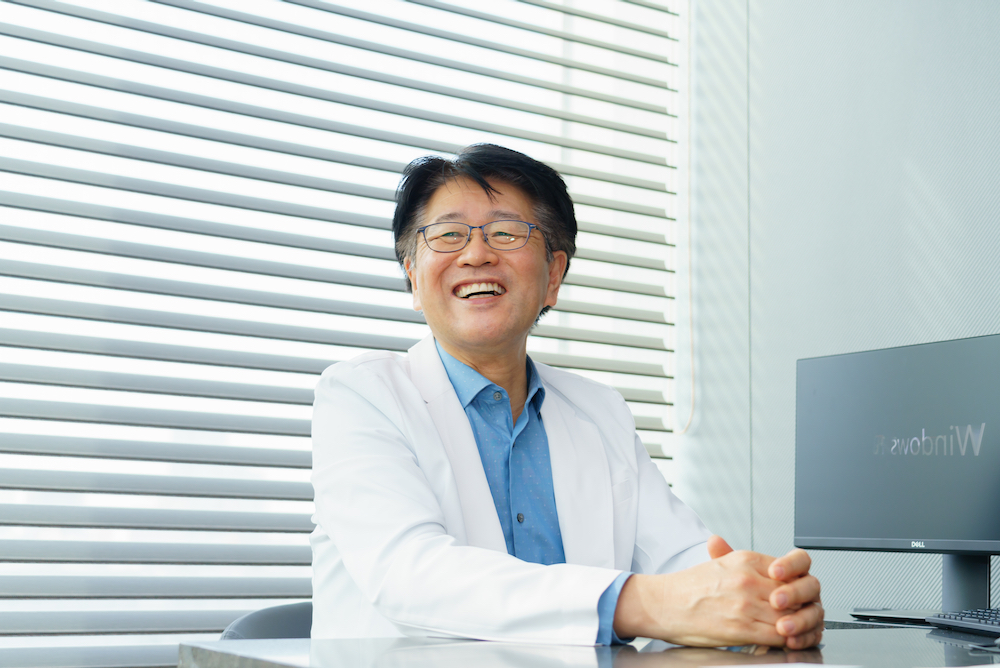
Dr. Junichi Taguchi, Director of Tokyo Midtown Clinic, Nihonbashi Muromachi Mitsui Tower
AI for Prediction of Risk of Lifestyle Diseases will Change Our Lives
Taihei Yamaguchi from the Corporate Technology Planning Division at Toshiba Corporation, is leading the efforts to create solutions that utilize this AI, he is also the liaison person between Dr. Taguchi and the researchers at Toshiba. While Yamaguchi initially joined Toshiba as a semiconductor engineer, he was passionate about resolving the challenges we face in society and was eager to join new businesses. Asked about his thoughts and feelings on the project, he said,
“Large companies accumulate vast volumes of data from their employees’ medical check-ups and medications that go back years. By analyzing this data with Toshiba’s AI technologies, I felt that we could create a solution that would issue an alert before people start to develop lifestyle diseases, which could then help improve their habits. In a super-aging society, what’s important is figuring out how to extend a person’s healthy life years, which is the number of years a person can live in good physical and mental health. Seeing as how we are the most rapidly aging country, I hope we can deliver a solution from Japan to the world that only Toshiba is capable of creating.”
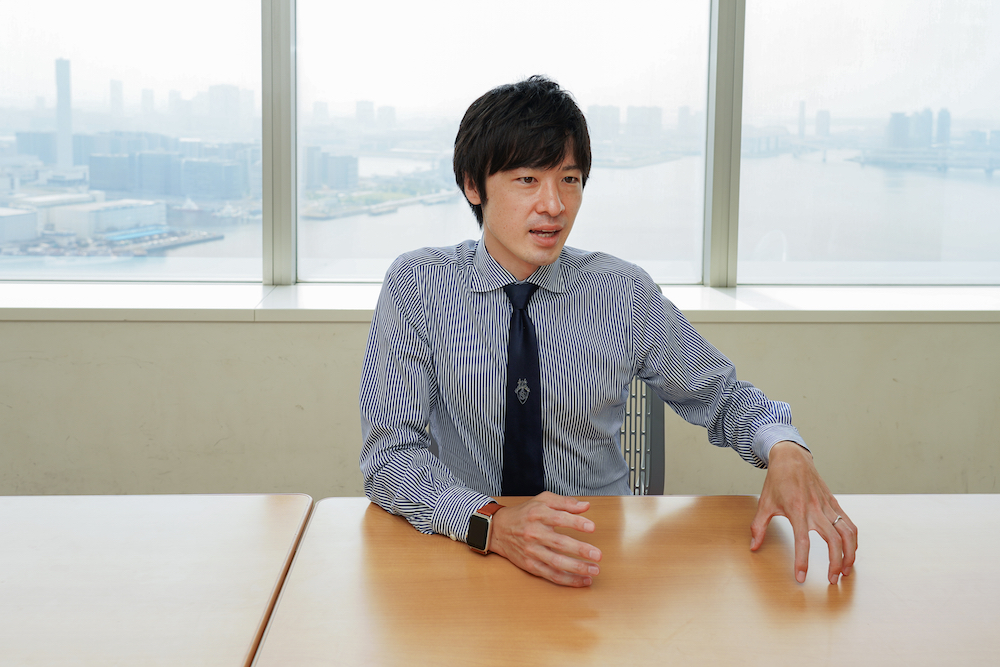
Taihei Yamaguchi, Specialist in the Life Science Promotion Office, Corporate Technology Planning Division, Toshiba Corporation
So how exactly does this solution work? The AI for prediction of risk of lifestyle diseases first reads the data from a medical check-up, such as the person’s blood pressure, abdominal circumference and how often he or she drinks alcohol. It then calculates, in number of years, when the person’s current health condition will reach a point that requires a warning and when it will reach a point that is deemed to be dangerous (at which point the person would be diagnosed with a lifestyle disease). The AI can predict six diseases: diabetes, kidney disease, liver disease, hypertension, hyperlipidemia and metabolic syndrome. Users can also change the lifestyle habit parameters, such as exercise or alcohol consumption, to show how much behavioral improvements can reduce the risk of developing a lifestyle disease. Being given just the numerical figures of a medical check-up may not mean much to us, but to see our risk of developing a disease as visuals can better encourage us to change our habits.
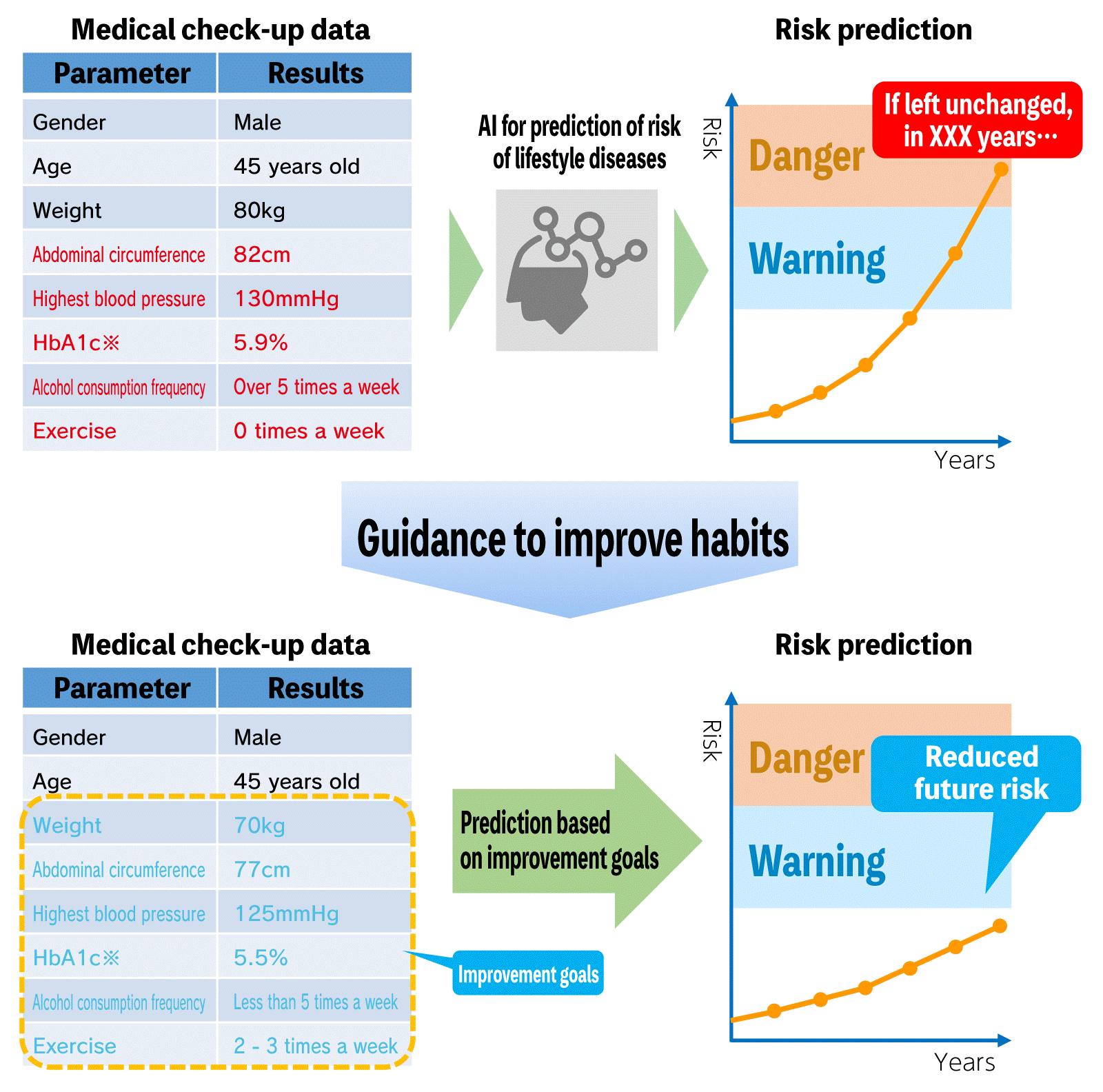
AI for prediction of risk of lifestyle diseases
So now that you know the risk, you may also want to know what exactly you need to change right now to lower that risk to a certain level. An AI that can do that—in other words not only predict the risks but also calculate the goals that a person needs to aim for to stay healthy—is currently under development. These improvement goals, like weight reduction, are also catered specifically to each individual person. So these two types of AI—one that predicts the risk of developing a disease and one that calculates improvement goals—answer two fundamental questions. “How high is my risk of developing a lifestyle disease at a certain point in the future if I keep living the way I am?” and “What exactly and how much of my lifestyle habits do I need to change if I want to reduce that risk level?” These concrete goals can make the matter feel more personal, and with the guidance offered by a physician, we can better dedicate ourselves to improving our lifestyle habits.
Of paramount importance to developing these AI solutions were high-quality data, such as medical check-up reports and health insurance claims*. Yamaguchi sought cooperation from the Toshiba Health Insurance Association (hereinafter Toshiba Health Insurance) and the Human Resources & Administration Division to use such data for analysis. After all, there are only a few places where one can find high-quality data, almost like an epidemiology database, with information on several hundred thousand patients, their medical check-up results and medication histories all stored in chronological order. However, since the data contains personal information, it needed to be handled with the utmost care. This meant ensuring security measures to protect the data while also convincing the Toshiba Health Insurance and Human Resources & Administration Division of the necessity of creating these solutions. So Yamaguchi paid individual visits to Toshiba’s industrial physicians and public health nurses across Japan to gather information on the challenges they face in the field. He then explained to the Toshiba Health Insurance and Human Resources & Administration Division that these solutions would help overcome such challenges. In this way, he successfully created a cooperative framework.
*Monthly statement of medical expenses, such as for prescriptions, that medical institutes submit to health insurance associations.
Yamaguchi’s experience of visiting various offices and listening to the voices of industrial physicians and company employees convinced him of the importance of these solutions. At the same time, he recognized anew the heavy responsibility of becoming involved in the medical field and how important it is to do the right thing. To this end, Yamaguchi is hoping to develop these solutions by working together with various experts and organizations so that the AI technologies can reach as many people as possible. While other companies are also developing services that use similar AI functions to predict the risk of developing a disease, Yamaguchi is focused on not just achieving a high prediction accuracy but also bringing together different organizations and their various strengths to create comprehensive value together.
Next edition, Worried About Your Future Health? Toshiba’s AI Technologies Can Predict Your Risk of Developing a Lifestyle Disease (Part 2), will feature how the AI was developed and what it hopes to achieve.
![]()






